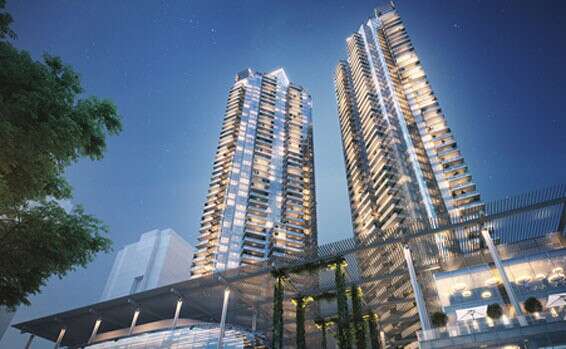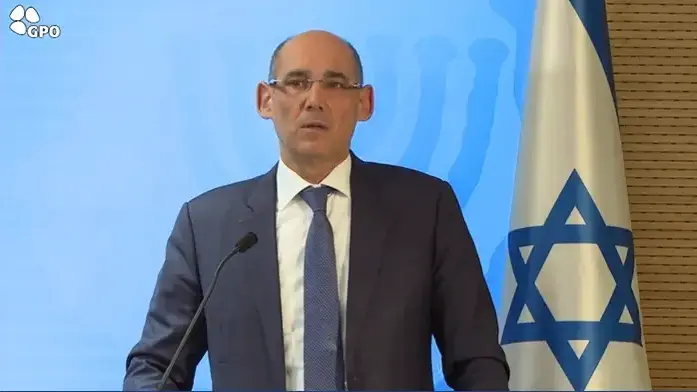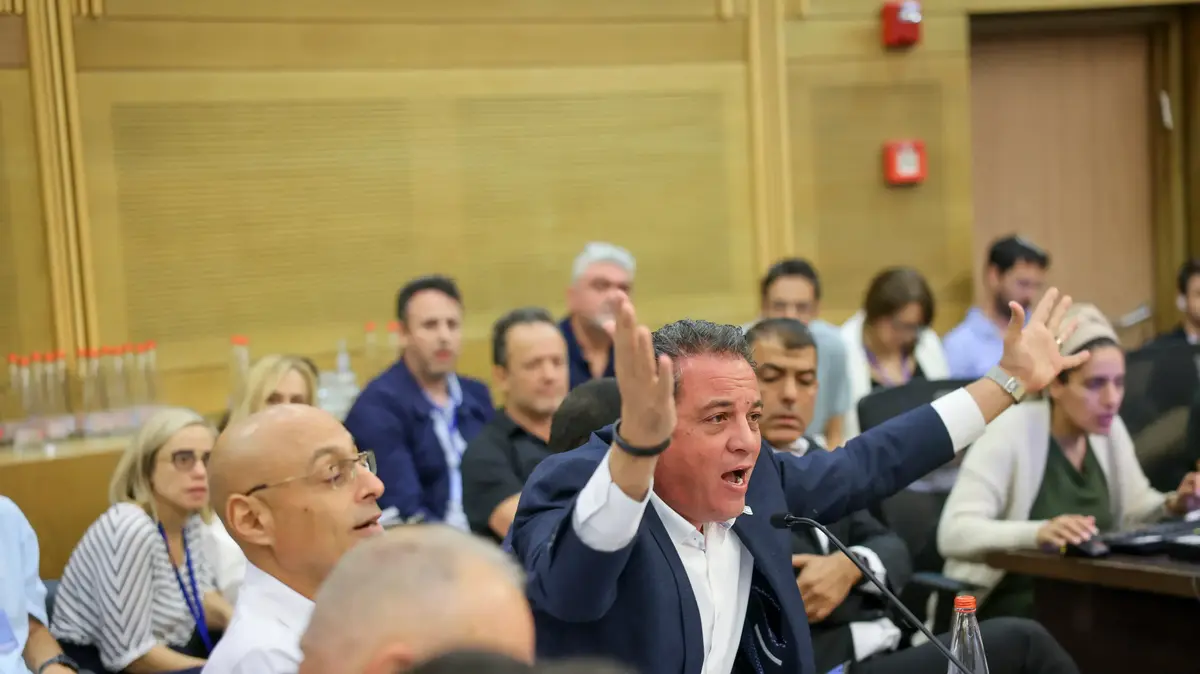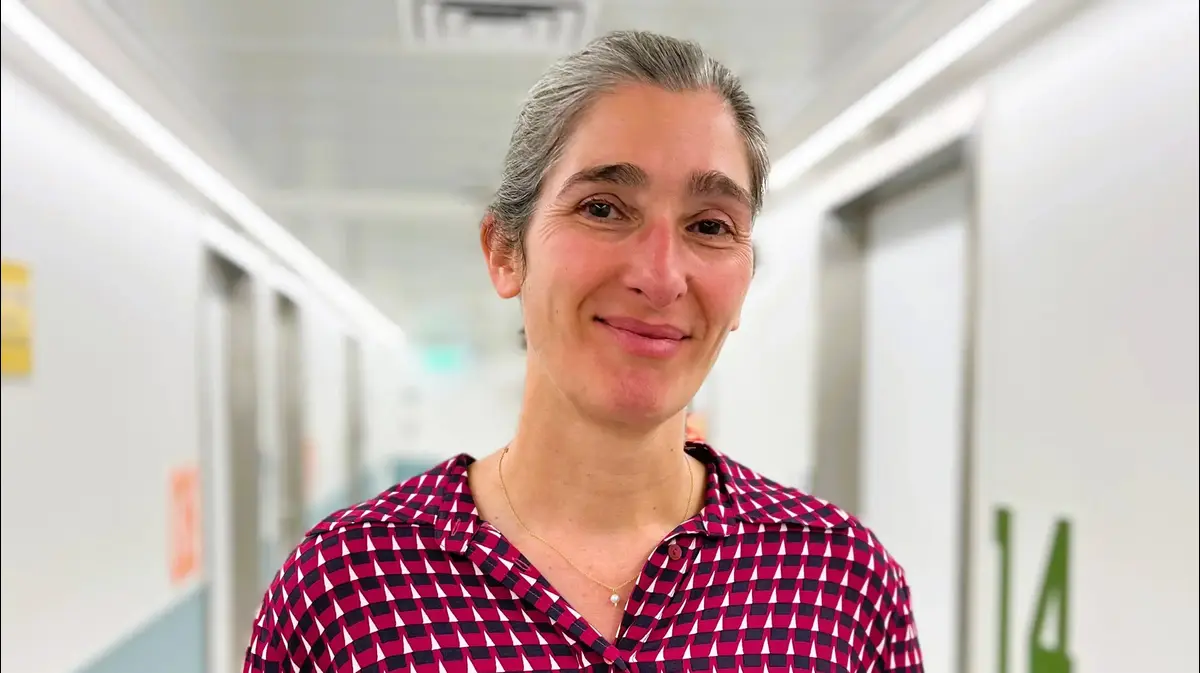The corona has brought about changes in living habits: adapted apartments, shared spaces and even beyond the periphery
Leap in sales.
EXCHANGE project in Ramat Gan of the Azorim companies
Photo:
Imaging: 3Dvision
Produced by the Department of Special Supplements
The corona crisis and the closures imposed on the public have caused many Israelis to recalculate their living environment.
There has been a sharp increase in demand for garden apartments, penthouses and apartments with large balconies, as well as for large apartments with a study or shared work spaces in the building.
How is all this possible, when the economic capacity of the average household is reduced due to the virus?
It turns out that the radius of apartment searches has widened.
The residents of Gush Dan realized that nothing happens if they move a little away from the expensive center to the cheaper spaces.
"We are used to barely 200 inquiries a month from people who are interested in moving to the area," says Haim Rokach, head of the Golan Regional Council.
"Following the corona, about 1,500 inquiries a month are received from people who understand that quality of life is measured in green spaces.
We do not have the ability to respond to requests without assistance.
Because of the lack of government, the potential to settle the periphery is doomed. '
The entrepreneurs also discovered a new-old market segment during this period - foreign residents who see Israel being vaccinated in the best way and return to Israel.
This is in addition to the return of investors to the market, following the reduction of the purchase tax.
The numbers speak for themselves: According to the chief economist at the Ministry of Finance, 13,400 apartments were purchased in December, the most since June 2015. This is an increase of 27% compared to December 2019, and an increase of 15% compared to the previous month.
The contractors sold 5,400 apartments this month, a record of at least 20 years.
Investors' purchases totaled 2,500 apartments, the highest level since March 2016.
In the months of October-November 2020 there were about 27,000 searches for apartments with a balcony, compared to only about 15,000 before the Corona.
This is according to data from the Yad2 website.
In October-November 29% of surfers were looking for garden apartments, compared to 22% to 25% before the Corona.
According to Yavin Gil Moore, CEO of the Yad2 website, "the data clearly show that the corona crisis has sharpened the importance of the living space in the apartment and the outdoor space."
Quiet corner
Yossi Koren, VP of Marketing for the Moore Group, describes the changes: "We identify a preference for open commercial complexes, pop-up stores and it is possible that later offices will be converted into residences. There are residential complexes that already offer all services under the house, and this trend will strengthen. Along with community characteristics and connection to nature. '
Meirav Bilt, Deputy CEO of the Aviv Construction Group, notes that the Corona has reinforced the need for space and a quiet corner.
"Transactions in the corona period are usually made with available money for the apartment after realization on the stock exchange or other volatile investment, in search of stability, in light of the understanding that real estate is not expected to fall," she adds.
Another change in consumption habits concerns the location of the apartment.
"We are witnessing a reversal of the trend among apartment buyers," explains Yaakov Atrakchi, CEO and owner of Aura Israel.
"If in the past they would choose the preferred location and only then examine the apartment itself, today the buyers first find the apartment that suits them best, and only then ask where it is located."
The crisis has brought about a change in lifestyle, and many are forced to work from home and look for a suitable apartment for this purpose.
The gardens and balconies have become the undisputed stars of the Corona Crisis, as a place of refuge during the days of closure.
"People are looking for an apartment for quick occupancy, and the most important thing for them is to have a work area, a large balcony or a garden," says Dorit Sadan, VP of marketing for the Shikun VeBinui company. .
Outside the building, she says, it is important to have small seating areas, parks and community gardens, which encourage a family experience with easy access with less crowding.
"The kitchen must also be large enough, because cooking and baking have become a central part of the joint work at home," she notes.
"We adapted ourselves quite quickly to the spirit of the time and made planning, design and marketing adjustments in the apartments," says Uri Fleischman, VP of Marketing and Sales at the Levinstein Group.
"For example, in the Netanya Cliff Tower project, which includes a 31-story tower with 117 apartments, space was allocated from the tenants' club in the building for work areas, which will form a common space for the building's occupants. In the Levinstein project in Nahala in Rishon Lezion,
Going big
Demand for penthouses has skyrocketed in the wake of the corona.
According to data from Yad2, before the outbreak of the plague, there were 60,000 searches for such apartments on the site, after which the demand jumped to 80,000 in the first wave, and in the second wave more than 100,000.
In the past penthouses were the hardest product to sell.
Roni Cohen, CEO of Elder Marketing, which markets about 90 projects around the country, explains that a penthouse is the crown jewel in every building, but its sales time is usually long.
"There is a limited amount of people who can afford it. The market segment is also limited in the level of supply," he says.
The recovery of the luxury market characterizes the period, after years of stagnation, thanks to Jewish capitalists who decided to invest their money in the country.
For example, a deal made at the beginning of the year, according to about NIS 115,000 per square meter in a luxury tower in Tel Aviv, Arlozorov 17 of Dan Real Estate. The buyers are a couple who lived in the United States and immigrated to Israel.
They paid NIS 84 million for the pleasure.
The floor area is 730 square meters and in addition 120 square meters of balconies.
According to Tali Sharon, VP of Marketing and Sales at the Ram Aderet Group: "There has been a significant increase in interest and the purchase of large and special apartments, and to our surprise today they are the first to be hijacked."
For example: in Ramla, 4 out of 8 penthouses were sold in the first months of marketing.
In the orchard project in the center of the Afridar neighborhood in Ashkelon, the Afridar company went into silent marketing (word of mouth) and sold 2 penthouses.
"Many residents outside Ashkelon are buying apartments in the new wine city neighborhood," updates Ofir Sharon, VP of marketing and business development at Afridar. "This is a population from the central region who are looking for more spacious apartments."
According to Yad2 data, the demand for 6-room apartments has also increased in the past year. According to Avi Zeituni, CEO and owner of A. Zeituni, which is building the new ECO Ramat Hadar project in Givat Shmuel, "The preference for large apartments is especially noticeable among our customers. "The religious-national. The family values are very high in this public even in the days when they were repaired, and during the Corona period they even sharpened in light of the joint stay at home. Remote work also affected preferences, and many decided to upgrade their apartment to 6 rooms and get a study."
Investors are back
The strongest expression of the upheaval is the return of investors to the housing market, following Finance Minister Israel Katz's decision to reduce the purchase tax.
The return of investors increases the collection of taxes during a difficult period for the state treasury and will help move the economy.
"The previous policy of the Israeli government saw real estate investors as a kind of enemy of the nation," says Assaf Kahner, VP of marketing at EWAVE NADLAN. "The result was that Israelis' money was sent overseas to build European capitals and large cities in the United States. Current policy Sees investors as legitimate partners. '
The luxury project DUO Tel Aviv in the Somail complex on Ibn Gvirol Street (where Africa Israel holds about 52% of the rights) includes a pair of 50-story towers with 668 units (designed by architects Avner Yashar and Orly Shrem). 127 applications were purchased out of 277 units. D. in the first tower, with a total financial volume of about NIS 652 million.
"This is an extraordinary achievement, given the high price of the apartments and the short marketing time of about a month and a half," says Dan Gingis, VP of Marketing for Africa Israel Residential.
Another example of accelerating sales can be seen in the EXCHANGE project of regional and tower companies at Elite Junction in Ramat Gan.
154 apartments were sold in two months, amounting to NIS 476 million.
"Thanks to the project, the company recorded a 32% jump in the number of apartments sold in the fourth quarter," reports Gil Gurevitch, Azorim's VP of marketing.
Another consequence of the Corona crisis in the residential sector is the transformation of the balcony from a luxury commodity into a real essential commodity and a characteristic of quality of life.
Haim Karadi, CEO of Praszkowski: "In the past, one of the main considerations for purchasing an apartment was a storage room. Today, the other parameter is the size of the balcony. In our projects, you can even buy an apartment with a balcony up to 200 square meters.
Our project in Ramla has balconies of 26 to 29 square meters, in Herzliya and Haifa 20 square meters for a 5-room apartment.
Racheli Brizel, VP of Marketing and Sales of the Ashdar Company of the Ashtrom Group: “The opportunity to go out on the balcony during the closure was a privilege for many families.
When we plan new apartments we think of the accommodation spaces for the benefit of the buyers.
Following the corona, the balcony, the kitchen and the living room receive special attention in the design of the apartment. "
According to Amir Cohen, VP of Marketing and Sales at YH Damari, "The special apartments offer flexibility and the possibility of creating work spaces, along with interior space that provides more mobility. We are witnessing an increase in demand for apartments with these characteristics in the company's various projects around the country."
Want to stay up to date all the time?
Sign up now for the Real Estate Newsletter today
Talk real estate with Ofer Petersburg. Listen to the new podcast >>
Yaffa Sadan, VP of Marketing and Sales at Yossi Avrahami, notes: "We identify two phenomena that have occurred in recent months - in our prestigious project, the Philharmonic in North Tel Aviv, there are buyers who want to connect apartments in order to purchase an apartment with a larger area.
In our other projects in Tel Aviv and Eilat, more special apartments were sold this year, such as penthouses and garden apartments, compared to previous years. "
Sivan Hilli, Vice President of Marketing and Sales at Cardan Real Estate: "The Corona taught us the difference between a balcony of 10 square meters and a balcony of 20 square meters and more. The balcony turned from a service area into a main area. The small and crowded apartments became a pressure cooker during the closure. "So the demand for spacious apartments has soared."
"The most significant thing that the Corona has taught us when it comes to housing is the importance of our living space," says Edith Friedman, marketing and sales manager at Metropolis. "This reality has led to a jump in the sale of large apartments, garden apartments and penthouses."
Expanding the radius
For the benefit of green spaces, a spacious yard and a swimming pool, many customers are now ready to leave the comfort zone of the center of the country and move to the periphery or satellite cities.
According to data from the Chief Economist at the Ministry of Finance, there was a decrease of about 10% in the purchase of apartments in Gush Dan, compared to an increase in the Negev and the Galilee.
"We are witnessing a growing demand for penthouses or garden apartments, even in the more remote circles of demand," says Ariel Edelstein, VP of marketing and sales at Avnei Derech.
"For example, in a milestone project in Alfei Menashe, a spacious two-story penthouse apartment in Tel Aviv can be purchased for an attractive price starting at NIS 1.98 million, for a 6-room apartment with an area of 160 square meters with a large balcony with a total area of 97 square meters."
The realization that the home is much more than a place to lay your head, encouraged many to expand their search radius in order to get much more than they had dreamed of in the past.
Ortal Lieber, Rothstein Real Estate's VP of Marketing: "An apartment is not just 4 walls. Families who want to fulfill the dream of grass, fruit trees, a dog kennel, a BBQ stand and of course going straight from the living room to an open space, now understand that quiet "The mental is worth the extra price. During the closure period, potential buyers were interested in garden apartments and apartments with large balconies. Projects in rural areas, such as Pardesiya, received inquiries from people who had difficulty passing this period in the city."
Architect Yoav Oman, owner and partner at Tito-Oman Architects: "Many employers have realized that working from home can be no less efficient than in the office. The result will most likely be a reduction in office space, which could lead to far-reaching real estate changes and a rise in the periphery." .
Remote sale
Remote marketing has regained its power and sales offices have found substitutes for human contact and face-to-face meetings.
Sivan Peretz, VP of Marketing at Bonni Hatichon: “The Corona period exposed us to technological innovation, which allowed us to be in touch with customers remotely, while saving time and resources for both parties.
It seems that we will adopt some of these platforms in the future as well. "
Raz Schreiber, VP of marketing for the Almog Group, which builds around the country, notes that communication and marketing methods have been streamlined. "We made our information accessible to customers through digital means, we also created platforms for distance selling in a friendly mobile application.
"Combining the digital dimension with the physical dimension and the flexibility we are trying to discover, provide a quality and correct solution for this period, and probably also after it."
The real estate industry has been recognized as the leading locomotive of the economy.
A kind of unit pride.
"There is great appreciation and pride in the profession among the workers and contractors in the industry," says Dan Levy, chief engineer at Geshem Holdings. "The real estate industry remains stable and even developing, wages are steadily rising.
This is a positive value that has made it clear to us where the industry stands in relation to others. "
The needs of many families have changed as a result of the virus and the prolonged stay at home.
"We are witnessing an increase in the trend of building apartments and offices at the shell level, and only after the purchase does the customer complete the interior design according to his needs," explains architect Guy Miloslavsky.
"We design flexible and multi-purpose living spaces that are suitable for both work and children's needs.
For example, a storage room that will be used as a living room, a study for children and a study. "
Another planning solution is to combine common workspaces for the use of the building's occupants.
This way the tenants can stay close to home and work in a quiet area.
They enjoy a suitable office infrastructure, quiet from the children and without disturbing the family in work calls.
The common spaces contribute to the development of social ties and a sense of belonging to the community.
"Ultimately," concludes Advocate Roni Tennenbaum, Gindi Holdings' VP of Marketing, "people internalize that their home can be a workplace that integrates with the living environment.
Many are looking to upgrade their apartment and choose a living area that will provide a solution for the environmental space. "
Produced by the Department of Special Supplements















